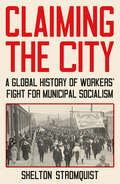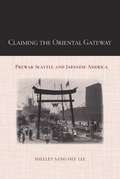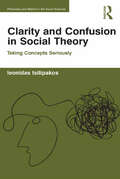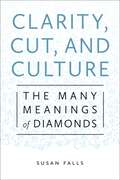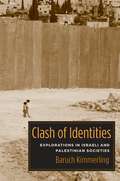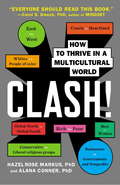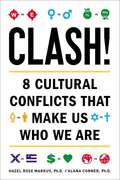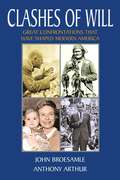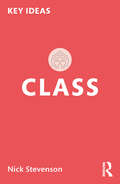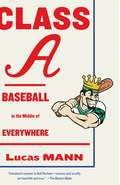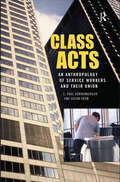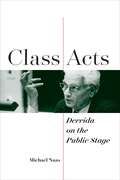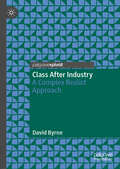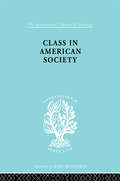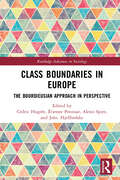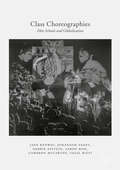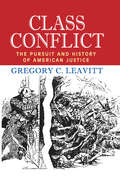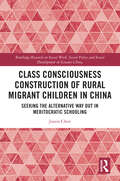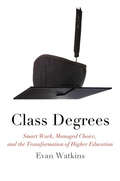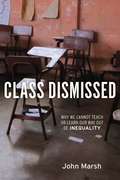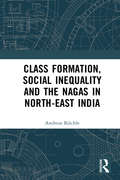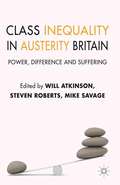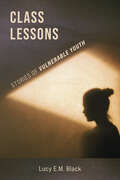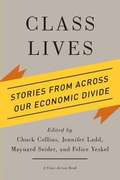- Table View
- List View
Claiming the City: A Global History of Workers’ Fight for Municipal Socialism
by Shelton StromquistHow workers fought for municipal socialism to make cities around the globe livable and democratic - and what the lessons are for today.For more than a century, municipal socialism has fired the imaginations of workers fighting to make cities livable and democratic. At every turn propertied elites challenged their right to govern. Prominent US labor historian, Shelton Stromquist, offers the first global account of the origins of this new trans-local socialist politics. He explains how and why cities after 1890 became crucibles for municipal socialism. Drawing on the colorful stories of local activists and their social-democratic movements in cities as diverse as Broken Hill, Christchurch, Malmö, Bradford, Stuttgart, Vienna, and Hamilton, OH, the book shows how this new urban politics arose. Long governed by propertied elites, cities in the nineteenth century were transformed by mass migration and industrialization that tore apart their physical and social fabric. Amidst massive strikes and faced with epidemic disease, fouled streets, unsafe water, decrepit housing, and with little economic security and few public amenities, urban workers invented a local politics that promised to democratize cities they might themselves govern and reclaim the wealth they created. This new politics challenged the class power of urban elites as well as the centralizing tendencies of national social-democratic movements. Municipal socialist ideas have continued to inspire activists in their fight for the right of cities to govern themselves.
Claiming the Oriental Gateway: Prewar Seattle and Japanese America
by Lee Shelley Sang-HeeIn Claiming the Oriental Gateway, Shelley Sang-Hee Lee explores the various intersections of urbanization, ethnic identity, and internationalism in the experience of Japanese Americans in early twentieth-century Seattle. She examines the development and self-image of the city by documenting how U. S. expansion, Asian trans-Pacific migration, and internationalism were manifested locally—and how these forces affected residents’ relationships with one another and their surroundings. Lee details the significant role Japanese Americans—both immigrants and U. S. born citizens—played in the social and civic life of the city as a means of becoming American. Seattle embraced the idea of cosmopolitanism and boosted its role as a cultural and commercial "Gateway to the Orient" at the same time as it limited the ways in which Asian Americans could participate in the public schools, local art production, civic celebrations, and sports. She also looks at how Japan encouraged the notion of the "gateway" in its participation in the Alaska-Yukon-Pacific Exposition and International Potlach. Claiming the Oriental Gateway thus offers an illuminating study of the "Pacific Era" and trans-Pacific relations in the first four decades of the twentieth century.
Clarity and Confusion in Social Theory: Taking Concepts Seriously (Philosophy and Method in the Social Sciences)
by Leonidas TsilipakosDeparting from a concern with certain ’hard’ problems in social theory and focusing instead on the theoretical strategies employed in their solution, especially on how these strategies depend on what the author calls the theoretical attitude towards language, this book considers whether these strategies, far from being indispensable guides to thinking, might in fact lead social theorists to misunderstand the concepts constitutive of social life. Making use of the insights and practice of Ordinary Language Philosophy, understood as encompassing the work of Wittgenstein, Ryle, Austin and their followers, Clarity and Confusion in Social Theory reveals the profound logical flaws in some of the central methodological procedures often employed in social theory for dealing with concepts, offering alternative approaches to social scientists and philosophers for tackling the conceptual issues that have so bedevilled social science from its inception. A lucid explication of Ordinary Language Philosophy and the potential that it offers for deepening and re-orienting theoretical work in the social sciences, this volume, apart from being a challenge to the influential Critical Realist paradigm, constitutes a radical critique of social theoretical reason. As such, it will appeal to social theorists and philosophers of social science, those with interests in research methods and theory construction, and anyone interested in thinking clearly about society.
Clarity, Cut, and Culture: The Many Meanings of Diamonds
by Susan FallsWhat our obsession with diamonds reveals about our material cultureImages of diamonds appear everywhere in American culture. And everyone who has a diamond has a story to tell about it. Our stories about diamonds not only reveal what we do with these tiny stones, but also suggest how we create value, meaning, and identity through our interactions with material culture in general.Things become meaningful through our interactions with them, but how do people go about making meaning? What can we learn from an ethnography about the production of identity, creation of kinship, and use of diamonds in understanding selves and social relationships? By what means do people positioned within a globalized political-economy and a compelling universe of advertising interact locally with these tiny polished rocks?This book draws on 12 months of fieldwork with diamond consumers in New York City as well as an analysis of the iconic De Beers campaign that promised romance, status, and glamour to anyone who bought a diamond to show that this thematic pool is just one resource among many that diamond owners draw upon to engage with their own stones. The volume highlights the important roles that memory, context, and circumstance also play in shaping how people interpret and then use objects in making personal worlds. It shows that besides operating as subjects in an ad-burdened universe, consumers are highly creative, idiosyncratic, and theatrical agents.
Clash of Identities: Explorations in Israeli and Palestinian Societies
by Baruch KimmerlingBy revisiting the past hundred years of shared Palestinian and Jewish-Israeli history, Baruch Kimmerling reveals surprising relations of influence between a stateless indigenous society and the settler-immigrants who would later form the state of Israel. Shattering our assumptions about these two seemingly irreconcilable cultures, Kimmerling composes a sophisticated portrait of one side's behavior and characteristics and the way in which they irrevocably shaped those of the other. Kimmerling focuses on the clashes, tensions, and complementarities that link Jewish, Palestinian, and Israeli identities. He explores the phenomena of reciprocal relationships between Jewish and Arab communities in mandatory Palestine, relations between state and society in Israel, patterns of militarism, the problems of jurisdiction in an immigrant-settler society, and the ongoing struggle of Israel to achieve legitimacy as both a Jewish and a democratic state. By merging Israeli and Jewish studies with a vast body of scholarship on Palestinians and the Middle East, Kimmerling introduces a unique conceptual framework for analyzing the cultural, political, and material overlap of both societies. A must read for those concerned with Israel and the relations between Jews and Arabs, Clash of Identities is a provocative exploration of the ever-evolving, always-contending identities available to Israelis and Palestinians and the fascinating contexts in which they take form.
Clash of Identities: Explorations in Israeli and Palestinian Societies
by Baruch KimmerlingBy revisiting the past hundred years of shared Palestinian and Jewish-Israeli history, Baruch Kimmerling reveals surprising relations of influence between a stateless indigenous society and the settler-immigrants who would later form the state of Israel. Shattering our assumptions about these two seemingly irreconcilable cultures, Kimmerling composes a sophisticated portrait of one side's behavior and characteristics and the way in which they irrevocably shaped those of the other.Kimmerling focuses on the clashes, tensions, and complementarities that link Jewish, Palestinian, and Israeli identities. He explores the phenomena of reciprocal relationships between Jewish and Arab communities in mandatory Palestine, relations between state and society in Israel, patterns of militarism, the problems of jurisdiction in an immigrant-settler society, and the ongoing struggle of Israel to achieve legitimacy as both a Jewish and a democratic state. By merging Israeli and Jewish studies with a vast body of scholarship on Palestinians and the Middle East, Kimmerling introduces a unique conceptual framework for analyzing the cultural, political, and material overlap of both societies. A must read for those concerned with Israel and the relations between Jews and Arabs, Clash of Identities is a provocative exploration of the ever-evolving, always-contending identities available to Israelis and Palestinians and the fascinating contexts in which they take form.
Clash!
by Hazel Rose Markus Alana ConnerAs the world gets smaller, hotter, and flatter, people from different cultures are colliding like never before: East Asian students now dominate Western schools and workplaces, yet crash into the so-called "bamboo ceiling" before reaching the top. Women are getting stuck as they rocket up the corporate ladder, while men are falling off the ladder altogether. The have-nots still struggle in the classrooms of the haves, widening the gap between rich and poor. Many Blacks, Latinos, and other people of color know that discrimination keeps them down, while many Whites sincerely believe that race no longer matters. The politics of conservative Protestants frighten Americans of other religions, while the politics of more mainstream traditions infuriate the conservatives. Midwesterners and Southerners get depressed when they relocate to the Coasts, and vice versa. Despite the need for more collaboration, partnerships between governments, businesses, and nonprofits too often fail. Governments in the Global North and Global South still can't agree about what counts as "fair," "honest," and "efficient. " Although each of these eight conflicts seems unique, we reveal that many stem from the same root cause: the tension between people using the independent, separate, and in-control side of their selves, versus people using the interdependent, connected, and adjusting side. We also show how people can nudge their cultures to call forth their best selves. By knowing when and how to use our different selves, we may not just survive, but thrive in the 21st century.
Clash! 8 Cultural Conflicts That Make Us Who We Are
by Hazel Rose Markus Alana ConnerWhat kind of person are you? Are you independent--individual, unique, and in control of your world? Are you interdependent--relational, similar to others, and good at adjusting to situations? Or are you both? In Clash!, leading cultural psychologists Hazel Rose Markus and Alana Conner show us how our cultural backgrounds create and reflect these two basic ways of being a self, which then shapes everything from how we run our governments to how we raise our children. Markus and Conner also demonstrate how clashes between independence and interdependence fuel many of today's most pressing conflicts, including tensions between East and West, the Global North and Global South, men and women, blacks and whites, conservative and liberal, religious groups, rich and poor, and businesses, governments, and nonprofits. Provocative and entertaining, Clash! offers solutions to many of the problems that plague our workplaces, schools, and relationships. For readers of The Culture Code by Clotaire Rapaille and The Wisdom of Crowds by James Surowiecki, it doesn't just explain who we are, it also envisions who we could become.
Clashes of Will: Great Confrontations That Have Shaped Modern America
by Anthony Arthur John J. BroesamleClashes of Wills is a collection of essays that explore the great confrontations of the United States since 1877, looking at eleven areas of controversy that are part of today's news, but whose sources lie in the past. By focusing on well-known people who represent these issues, the book creates stories that are selective, focused, and coherent, to paint a portrait of the United States in the past century and a half.
Class (Key Ideas)
by Nick StevensonThis accessible introductory text offers an engaging and thought-provoking discussion of class in relation to several cultural, sociological and political schools of thought and draws upon the works of a broad range of key theorists as well as contemporary thinkers to restate the ongoing importance of class as a sociological concept. Class has long been a key focus of sociological and political studies. This book explores what it might mean today in a twenty-first century context. Is class really disappearing? Is class morally justifiable? What impact has globalisation and neoliberalism had on the restructuring of class-based social relationships? These questions and others are explored in this short but lively book. Stevenson reviews a number of normative traditions including anarchist, Marxist, social democratic and citizenship-based forms of understanding of class in order to shed light on the themes of class-based experiences, health and inequality, work, class struggle, social movements and the possibility of developing more egalitarian and just societies in the future. This short book will be invaluable to general readers and students in the humanities and social sciences seeking an accessible introduction to the central problems raised by discussions of class in the twenty-first century.
Class A: Baseball in the Middle of Everywhere
by Lucas MannAn unforgettable chronicle of a year of minor-league baseball in a small Iowa town that follows not only the travails of the players of the Clinton LumberKings but also the lives of their dedicated fans and of the town itself. <P><P>Award-winning essayist Lucas Mann delivers a powerful debut in his telling of the story of the 2010 season of the Clinton LumberKings. Along the Mississippi River, in a Depression-era stadium, young prospects from all over the world compete for a chance to move up through the baseball ranks to the major leagues. <P>Their coaches, some of whom have spent nearly half a century in the game, watch from the dugout. In the bleachers, local fans call out from the same seats they've occupied year after year. And in the distance, smoke rises from the largest remaining factory in a town that once had more millionaires per capita than any other in America. <P>Mann turns his eye on the players, the coaches, the fans, the radio announcer, the town, and finally on himself, a young man raised on baseball, driven to know what still draws him to the stadium. <P>His voice is as fresh and funny as it is poignant, illuminating both the small triumphs and the harsh realities of minor-league ball. <P>Part sports story, part cultural exploration, part memoir, Class A is a moving and unique study of why we play, why we watch, and why we remember.From the Hardcover edition.
Class Acts: An Anthropology of Urban Workers and Their Union
by E. Paul Durrenberger Suzan EremAmerican labor leaders are constantly developing new programs to revive the union movement. What happens when these plans collide with the daily lives of front-line union staff and members? This book examines the often conflicting interests of key players in the trenches of a national effort to bring back the American labor movement. Brutally honest, funny, never dull, this anthropological ethnography shows the daily struggles of union members today to bring about positive change and hold together their urban labor union in an era of globalization, outsourcing, and deindustrialization. A union activist and an anthropologist (the authors) pair up to offer insideoutside views of labor unions and of how anthropological fieldwork is done. Explaining, coaching, and warning Paul of hazards, Suzan, the communications director for the Local, provides inside views and details of day-to-day interactions. Paul, the anthropologist, provides outside analytical views that related Suzan's experiences and his own observations to the wider view anthropology offers through ethnography, holism, and comparativism. The result is a story of one dynamic union local, one anthropological study, and the lit fuse that connects them until the end.
Class Acts: Derrida on the Public Stage (Perspectives in Continental Philosophy)
by Michael NaasClass Acts examines two often neglected aspects of Jacques Derrida’s work as a philosopher, his public presentations at lectures and conferences and his teaching, along with the question of the “speech act” that links them. What, Michael Naas asks, is one doing when one speaks in public in these ways?The book follows Derrida’s itinerary with regard to speech act theory across three public lectures, from 1971 to 1997, all given, for reasons the book seeks to explain, in Montreal. In these lectures, Derrida elaborated his critique of J. L. Austin and his own subsequent redefinition of speech act theory. The book then gives an overview of Derrida’s teaching career and his famous “seminar” presentations, along with his own explicit reflections on pedagogy and educational institutions beginning in the mid-1970s. Naas then shows through a reading of three recently published seminars—on life death, theory and practice, and forgiveness—just how Derrida the teacher interrogated and deployed speech act theory in his seminars. Whether in a conference hall or a classroom, Naas demonstrates, Derrida was always interested in the way spoken or written words might do more than simply communicate some meaning or intent but might give rise to something like an event. Class Acts bears witness to the possibility of such events in Derrida’s work as a pedagogue and a public intellectual.
Class After Industry: A Complex Realist Approach
by David ByrneThe transition to twenty-first century post-industrial capitalism from the ‘welfare’ industrial capitalism of the twentieth century, has affected the ways in which class is lived in terms of relational inequality and the factors that structure identity. Class After Industry takes a complex realist approach to the dynamics of individual lives, places, the social structure and analyses their significance in terms of class. A wide range of quantitative and qualitative studies are drawn on to explore how ‘life after industry’ shapes class, and the consequent potential for social change. The book will be of interest across the social sciences and beyond, to those concerned with how class forms might translate into political action.
Class American Socty Ils 103 (International Library of Sociology)
by Leonard ReissmanFirst published in 1998. Routledge is an imprint of Taylor & Francis, an informa company.
Class Boundaries in Europe: The Bourdieusian Approach in Perspective (Routledge Advances in Sociology)
by Johs. Hjellbrekke Alexis Spire Cédric Hugrée Étienne PenissatDrawing inspiration from Pierre Bourdieu’s social space theory, this book provides an unprecedent overview of class relations, covering topics such as class polarisation, cultural reproduction, political orientations, and globalisation. The book applies Bourdieusian social space approach to show how class boundaries have been maintained or transformed in different European countries. Based on quantiative data, it proposes a renewal of the analysis of distances, divides, and relations of domination between social classes, documenting objective and symbolic boundaries that form the basis of individuals’ living and working conditions in 11 European countries. Focusing on transformations of wealth inequalities, education strategies, and European labour markets, the book examines the role of cultural, economic and social capital. It will be of interest to students and scholars across the social sciences, in particular to those studying social and wealth inequalities in a comparative perspective and Master's students in European studies.
Class Choreographies: Elite Schools and Globalization
by Debbie Epstein Jane Kenway Johannah Fahey Aaron Koh Fazal Rizvi Cameron McCarthyAwarded Best Book prize by CIES Globalization and Education SIGAwarded 2nd Prize in the Society of Educational Studies Annual Book PrizeElite schools have always been social choreographers par excellence. The world over, they put together highly dexterous performances as they stage and restage changing relations of ruling. They are adept at aligning their social choreographies to shifting historical conditions and cultural tastes. In multiple theatres, they now regularly rehearse the irregular art of being global. Elite schools around the world are positioned at the intersecting pinnacles of various scales, systems and regimes of social, cultural, political and economic power. They have much in common but are also diverse. They illustrate how various modalities of power are enjoyed and put to work and how educational and social inequalities are shaped and shifted. They, thus, speak to the social zeitgeist. This book dissects this intricate choreography.
Class Conflict: The Pursuit and History of American Justice
by Gregory C. LeavittIn a just society the law not only applies to all equally, but also arises from the consent of the people it embraces. As such, justice implies that people have access to governance. A just society provides and guards social and individual rights for all its members. The freedom of speech, therefore, is a right of all, and society has institutionalized processes to guarantee that freedom.Due to the American people's understanding of exclusion and rank, the meaning of justice was fragmented by social status and class. While this book views American justice through a prism of social-class conflict, Gregory C. Leavitt argues that it would be incorrect to portray this perspective as somehow whole. American justice is relative to many cultural groupings and conditions and is thus at the same distance from its encompassing ideal understood by common Americans.Beginning with the late eighteenth century and ending in the late twentieth century, Leavitt traces the history of class conflict and the struggle for justice among Americans. He argues that class struggles remain a significant factor in American social problems, because the American situation grew out of government promises of freedom and liberty to the lower class and the development of a powerful middle class. This is a provocative contribution to the debate over the future of social justice in America.
Class Consciousness Construction of Rural Migrant Children in China: Seeking the Alternative Way Out in Meritocratic Schooling (Routledge Research on Social Work, Social Policy and Social Development in Greater China)
by Jiaxin ChenThe monograph examines the constructive process of class consciousness among rural migrant children in China and how their perceptions of the social reality are shaped within their interactions with the family, community, and school contexts. Using evidence from qualitative investigations conducted in two Beijing primary schools, one public school and one private migrant school, the author explores the nexus of social class structure, schooling process, and consciousness construction of rural migrant children, which helps understand rural migrant children’s perceived way out of their social reproduction loop, foresee the future working-class formation in Chinese society, and seek the possibility of fostering a critical consciousness of China’s new workers via education channels. The book will appeal to researchers and students studying migrant children, migrant workers, and education in China. Those who research underprivileged children from the perspective of student agency/student resistance and through a Freirean lens could also be an audience for this book.
Class Degrees: Smart Work, Managed Choice, and the Transformation of Higher Education
by Evan WatkinsA current truism holds that the undergraduate degree today is equivalent to the high-school diploma of yesterday. But undergraduates at a research university would probably not recognize themselves in the historical mirror of high-school vocational education. Students in a vast range of institutions are encouraged to look up the educational social scale, whereas earlier vocational education was designed to “cool out” expectations of social advancement by training a working class prepared for massive industrialization.In Class Degrees, Evan Watkins argues that reforms in vocational education in the 1980s and 1990s can explain a great deal about the changing directions of class formation in the United States, as well as how postsecondary educational institutions are changing. Responding to a demand for flexibility in job skills and reflecting a consequent aspiration to choice and perpetual job mobility, those reforms aimed to eliminate the separate academic status of vocational education. They transformed it from a “cooling out” to a “heating up” of class expectations. The result has been a culture of hyperindividualism. The hyperindividual lives in a world permeated with against-all-odds plots, from “beat the odds” of long supermarket checkout lines by using self-checkout and buying FasTrak transponders to beat the odds of traffic jams, to the endless superheroes on film and TV who daily save various sorts of planets and things against all odds.Of course, a few people can beat the odds only if most other people do not. As choice begins to replace the selling of individual labor at the core of contemporary class formation, the result is a sort of waste labor left behind by the competitive process. Provocatively, Watkins argues that, in the twenty-first century, academic work in the humanities is assuming the management function of reclaiming this waste labor as a motor force for the future.
Class Dismissed: Why We Cannot Teach or Learn Our Way Out of Inequality
by John MarshIn Class Dismissed, John Marsh debunks a myth cherished by journalists, politicians, and economists: that growing poverty and inequality in the United States can be solved through education. Using sophisticated analysis combined with personal experience in the classroom, Marsh not only shows that education has little impact on poverty and inequality, but that our mistaken beliefs actively shape the way we structure our schools and what we teach in them. Rather than focus attention on the hierarchy of jobs and power--where most jobs require relatively little education, and the poor enjoy very little political power--money is funneled into educational endeavors that ultimately do nothing to challenge established social structures, and in fact reinforce them. And when educational programs prove ineffective at reducing inequality, the ones whom these programs were intended to help end up blaming themselves. Marsh's struggle to grasp the connection between education, poverty, and inequality is both powerful and poignant.
Class Formation, Social Inequality and the Nagas in North-East India
by Andreas KüchleThis book examines the question of class formation and social inequality within tribal groups in North-East India. Focussing on the Nagas, it analyses and challenges common perceptions about them as a class-less society with a uniform culture. It looks at the previously neglected themes of class formation and structure, division of work, emerging social milieus and cultural differentiation among the Naga youth – and presents fresh arguments about notions of modernity. Providing a theoretical understanding of inequality, this volume will be useful for scholars and researchers of North-East India, tribal studies, exclusion studies, sociology, social anthropology, political studies, development studies, cultural studies and South Asian studies.
Class Inequality in Austerity Britain
by Mike Savage Will Atkinson Steven RobertsWhen the Coalition Government came to power in 2010 in claimed it would deliver not just austerity, as necessary as that apparently was, but also fairness. This volume subjects this pledge to critical interrogation by exposing the interests behind the policy programme pursued and their damaging effects on class inequalities. Situated within a recognition of the longer-term rise of neoliberal politics, reflections on the status of sociology as a source of critique and current debates over the relationship between the cultural and economic dimensions of social class, the contributors cover an impressively wide range of relevant topics, from education, family policy and community to crime and consumption, shedding new light on the experience of domination in the early 21st Century.
Class Lessons: Stories of Vulnerable Youth
by Lucy E. M. BlackToday' s schools are meant to be all things to all people, but can they be? Schools are responsible for socialization, skills development and knowledge acquisition which take place within an institution serving disparate student populations. Unfortunately, school success is not experienced by all students, especially those for whom chaotic home lives are overwhelming. Schools should provide an important safe haven for students, offering advocacy and wraparound care. Fictionalized to protect the identities of those involved, the narratives between these pages shine a spotlight on the vulnerability of youth, and in particular, young people living in heart-breaking circumstances. Upholding the work that takes place in schools and embracing those support systems which are shared between school and community is crucial to enacting lasting and positive change. Drawn from the life experiences of a career educator, this collection seeks to highlight a broad range of needs while also reinforcing the way forward through school-community partnerships.
Class Lives: Stories From Across Our Economic Divide
by Chuck Collins Felice Yeskel Jennifer Ladd Maynard SeiderClass Lives is an anthology of narratives dramatizing the lived experience of class in America. It includes forty original essays from authors who represent a range of classes, genders, races, ethnicities, ages, and occupations across the United States. Born into poverty, working class, the middle class, and the owning class--and every place in between--the contributors describe their class journeys in narrative form, recounting one or two key stories that illustrate their growing awareness of class and their place, changing or stable, within the class system. The stories in Class Lives are both gripping and moving. One contributor grows up in hunger and as an adult becomes an advocate for the poor and homeless. Another acknowledges the truth that her working-class father's achievements afforded her and the rest of the family access to people with power. A gifted child from a working-class home soon understands that intelligence is a commodity but finds his background incompatible with his aspirations and so attempts to divide his life into separate worlds. Together, these essays form a powerful narrative about the experience of class and the importance of learning about classism, class cultures, and the intersections of class, race, and gender. Class Lives will be a helpful resource for students, teachers, sociologists, diversity trainers, activists, and a general audience. It will leave readers with an appreciation of the poignancy and power of class and the journeys that Americans grapple with on a daily basis.
